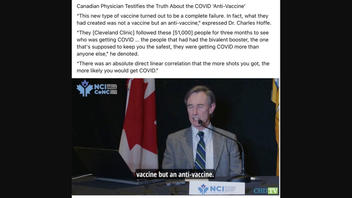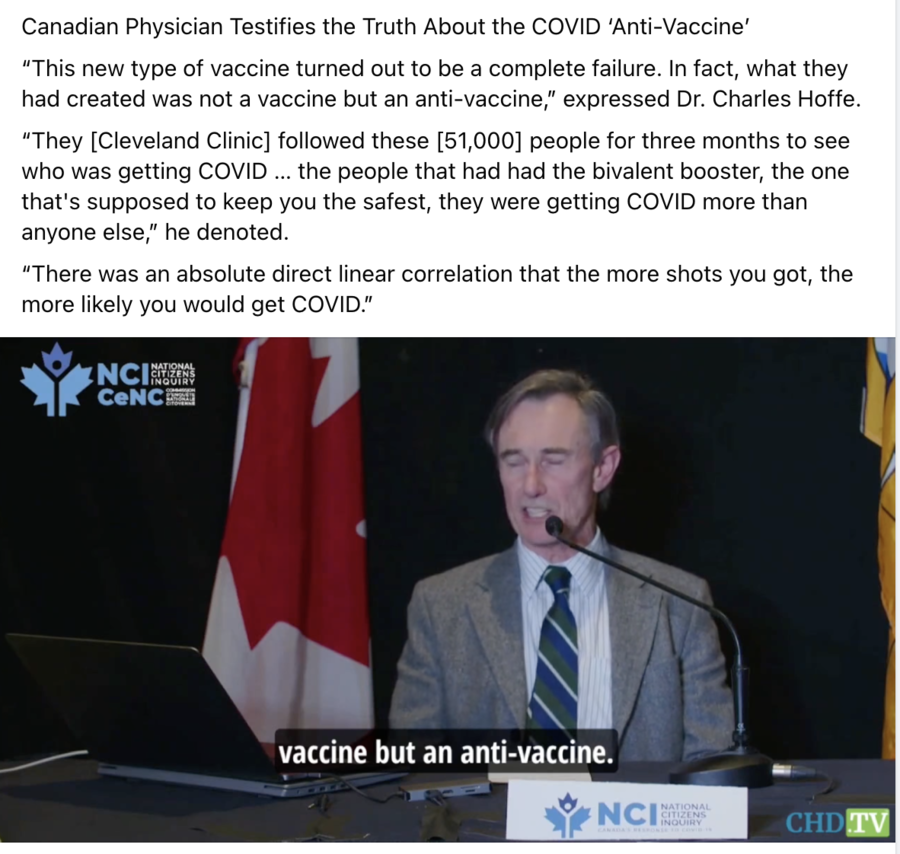
Does a study conducted by researchers at the Cleveland Clinic provide an "absolute direct linear correlation" that the more COVID-19 vaccines a person receives, the higher likelihood that person has of contracting the disease, thus proving that the bivalent vaccine was a "complete failure"? No, that's not true: Dr. Nabin Shrestha, an infectious disease expert and one of the cited study's authors, told Lead Stories that it is incorrect to characterize the research as a "direct linear correlation" and that the bivalent vaccine was not a "complete failure." Rather, the study showed that the "bivalent vaccine is less effective against more recent strains" and that further research should be "done in other populations to see if the findings hold up," said Shrestha.
A version of the claim originated in a video shared on Facebook on August 9, 2023 (archived here), that showed Charles Hoffe, a Canadian physician and anti-vaccine activist, presenting data from a Cleveland Clinic study. Hoffe claimed the research proved that each supplemental dose of the COVID vaccine increased a person's risk of contracting the coronavirus.
A caption that accompanied the video read:
Canadian Physician Testifies the Truth About the COVID 'Anti-Vaccine'
"This new type of vaccine turned out to be a complete failure. In fact, what they had created was not a vaccine but an anti-vaccine," expressed Dr. Charles Hoffe.
"They [Cleveland Clinic] followed these [51,000] people for three months to see who was getting COVID ... the people that had had the bivalent booster, the one that's supposed to keep you the safest, they were getting COVID more than anyone else," he denoted.
"There was an absolute direct linear correlation that the more shots you got, the more likely you would get COVID."
Below is how the post appeared at the time of publication:
(Source: Facebook screengrab taken Thurs Aug 17 09:49:29 UTC 2023)
In actuality, the cited study found that vaccines have become less effective against new strains of the SARS-CoV-2 -- not that receiving additional boosters increases the risk of infection.
The study that Hoffe alluded to was published on April 19, 2023, in the peer-reviewed journal Open Forum Infectious Diseases. Titled "Effectiveness of the Coronavirus Disease 2019 Bivalent Vaccine," the study evaluated whether the bivalent COVID vaccine protected against infection. (Lead Stories previously fact-checked erroneous claims made about the study findings when it was still in pre-print in January 2023.)
A different version of the Facebook video was also shared on X, the platform formerly known as Twitter, by Children's Health Defense on May 12, 2023, (archived here) and included false statements made during a May 2023 testimony to the National Citizen's Inquiry (NCI), a group unaffiliated with the government that claims to be investigating Canada's COVID response.
Hoffe's statements do not represent the study findings
The study's authors told Lead Stories that such claims are not an accurate reflection of their research.
"Our study found an association between more doses of vaccine and higher risk of COVID, but these findings by themselves are not enough to say that these provided proof that each supplemental dose of COVID vaccine increased a person's risk of contracting the coronavirus," study author Dr. Nabin Shrestha, a staff physician in the Department of Infectious Diseases at the Cleveland Clinic, wrote to Lead Stories in an email received on August 18, 2023.
Shrestha added that it was incorrect to use the term "direct linear correlation" as Hoffe had because the study was not a linear regression analysis.
"I would say our study found a statistically significant association between a higher number of vaccine doses and a higher risk of COVID," said Shrestha.
But this doesn't mean that COVID vaccines decrease immunity to infection. More on that below.
The study informs scientific understanding regarding the bivalent vaccine
As opposed to the original monovalent vaccine, the Food and Drug Administration (FDA) reports the bivalent contains two parts, a component that corresponds to the original virus strain and a second that corresponds to the omicron variant.
To come to their conclusions, the Cleveland Clinic researchers looked at the frequency of COVID infection among Ohio health care workers during the omicron wave in 2022. The positive correlation between the number of vaccine doses and infection risk doesn't prove that the vaccine caused that increase, but rather that the bivalent vaccine wasn't as effective against omicron as it was believed to be.
Shrestha told Lead Stories:
This study emphasizes the point that one should not assume a vaccine works against a circulating strain of COVID-19 without actually studying its effectiveness in that particular strain. The bivalent vaccine was not a 'complete failure.' It was about 29% effective when the BA.4/BA.5 strains were the predominant circulating strains, and about 20% effective when the DQ strain was the predominant circulating strain.
Because the study was conducted in a presumably healthy working-age population -- it did not include children and only a few elderly patients -- Shrestha reiterated that the research should be replicated in other populations with different circulating strains to see if the findings hold up.
Michael Imperiale, a molecular biologist at the University of Michigan Medical School who is not affiliated with the study, told Lead Stories that the correlation presented by Hoffe is "not existent," and that "correlation is not causation."
"What the Cleveland Clinic study shows is that the bivalent vaccine is effective against the variants against which it was developed, along with related variants, but did not offer protection against XBB, which arose later and is more antigenically distinct," wrote Imperiale in an email to Lead Stories received August 17, 2023, referring to a COVID variant.
This, added Imperiale, is "exactly what the 'Conclusions' paragraph at the top of the publication states." That section read:
The bivalent COVID-19 vaccine given to working-aged adults afforded modest protection overall against COVID-19 while the BA.4/5 lineages were the dominant circulating strains, afforded less protection when the BQ lineages were dominant, and effectiveness was not demonstrated when the XBB lineages were dominant.
Hoffe has a history of spreading COVID misinformation
Hoffe is a family physician who was issued a citation on February 22, 2022, by the College of Physicians and Surgeons of BC (CPBSBC) for alleged misconduct. In April 2021, CPBSBC reported that he was believed to have violated standards imposed under the Health Professions Act, including but not limited to the Canadian Medical Association's Code of Ethics and Professionalism, by "publishing statements on social media and other digital platforms that were misleading, incorrect or inflammatory about vaccinations, treatments, and public measures" relating to COVID. Those claims included stating that ivermectin was a suitable treatment for COVID, that vaccinations caused "microscopic blood clots that cause serious neurological harm, female infertility, and a higher number of deaths," and for publicly expressing that vaccinated persons can cause harm to unvaccinated individuals. As of this publication, Hoffe's hearing was adjourned.
Lead Stories has also reported that it is not true that one in every 35 people who received a Moderna COVID-19 mRNA-1273 booster vaccination suffered myocardial injury, that ALC-0315, an ingredient in Pfizer's COVID vaccine, is not unsafe, and that a 2023 study did not prove that the Pfizer mRNA COVID vaccine causes "turbo cancer."


















